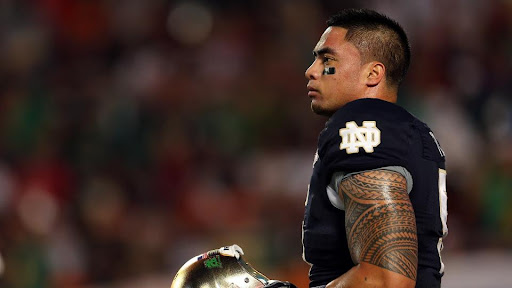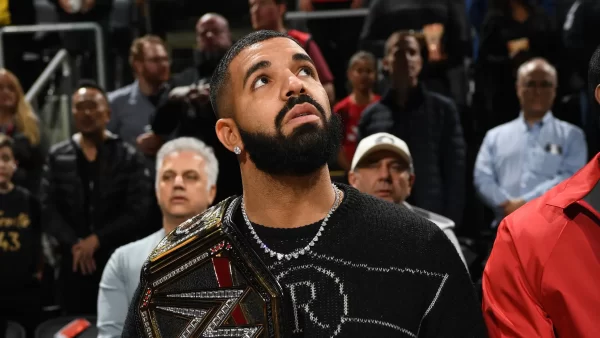The Manti Te’o Netflix Documentary Is A Great Watch

Te’o playing for the Notre Dame football team in 2013
In August, Netflix released the latest in its hit series Untold, a list of mini documentaries that showcases a wide range of sports-centered storylines. The latest, Untold: The Girlfriend Who Didn’t Exist, features the story of former Notre Dame football player Manti Te’o, and the hoax that was his online girlfriend, Lennay Kekua.
If you’re a current Allderdice student, it’s likely that you have no idea the story of Manti Te’o, a story that took the nation by storm in 2012-13. Te’o, who was a star linebacker for Notre Dame, was caught up in a tragedy when his grandmother and girlfriend both died on September 11, 2012. He would go on to dedicate his season to them, and had a magnificent performance during his senior year, which saw the Fighting Irish put up one of their best seasons in years.
However, one of the biggest stories in sports in years was not how it seemed.
After receiving an anonymous tip, Deadspin reporters Timothy Burke and Jack Dickey, who are interviewed in the documentary about their reporting of the story, began investigating whether Lennay was a real person.
This deep dive into the world of Lennay Kekua ultimately led to the earth-shattering January 16, 2013 Deadspin article in which Burke and Dickey asserted that Lennay did not exist, and pointed to a person named Ronaiah Tuiasosopo, who today is Naya Tuiasosopo, and that the pictures of Lennay were actually of a former high school classmate of Tuiasosopo’s.
The article and subsequent fallout from the catfishing hoax left Te’o to be in the media’s spotlight for all the wrong reasons, and the punchline of jokes for years to come. While catfishing is unfortunately more common today, it was much less well-known to the public and media 10 years ago, which unfortunately made the Te’o story all the more a rage to talk about.
Manti’s interview in the documentary is very powerful. Throughout the two-part documentary, Te’o emotionally relives the story of him and Lennay, from the beginning until the end. His willingness to share it all is brave enough, but to do it on camera for all the world to see is something even more.
Also featured in the documentary is Naya herself, who also details her experience with Te’o. Naya, a transgender woman, brings the perspective of playing the character of Lennay. She is important, albeit potentially controversial, in understanding the complete story and identity of Lennay Kekua. Lennay was so much more than a fake account.
Both Burke and Dickey also appear in the piece, detailing their investigation from the time they had received the anonymous tip, through the investigation process, and ultimately the decision to release the story when they did.
The decision to publish the story when they did was of high importance to the Deadspin team, as there was much concern amongst them that someone else would beat them to the story. Though in my personal opinion, the Deadspin reporters do not look good coming out of the documentary, but I think they’re aware of how they would appear to the public in today’s eyes.
The documentary also does an amazing job at detailing how much the Lennay situation had impacted his college and later professional football career. Te’o was the runner-up for the Heisman trophy in 2012, with the award ultimately going to Johnny Manziel, who if you know how his NFL career ended up playing out, can be a bit of a shocker to viewers.
The Lennay hoax also impacted Te’o’s 2013 NFL Draft status. Noted as one of the best available players in the draft, Te’o had fallen out of the first round. Te’o says in the documentary multiple NFL teams had talked with him prior to the draft. Every single team had asked him about the Lennay fiasco.
It is also stated in the documentary that the fiasco could have potentially cost Te’o millions of dollars as a result of him being taken in the second round of the draft as opposed to the first, where he was projected to be. Players taken in the first round of an NFL Draft often get far more lucrative deals then players taken in the later rounds.
Te’o would end up being taken in the second round, 38th overall by the San Diego Chargers, and would spend four years with the team, before going to New Orleans for three more seasons, and one more on the practice squad for the Chicago Bears. Te’o explains in the documentary how he suffered from a intense anxiety during his NFL career, and how desperate he was to be talked about as a football player, and not the victim of Lennay Kekua. While his NFL career may not have gone as far as some would have projected, given all of what Manti had to endure, his life and career is still incredibly impressive.
10 years after all of this, Te’o seems to be in a much better place, having healed and learning to love himself once again. His ending quote says it best:
“I’m going to rise above all that, bro. No matter how hard it is for me. I’m going to look at all these people who made fun of me and the people who actually believed in me. I have to take a second to be like, ‘They actually love me, man. They love you. They don’t want to make fun of you, bro.’ I’ll take all this crap. I’ll take all the jokes. I’ll take all the memes, so I can be an inspiration to the one who needs me to be. That’s the whole reason why I’m doing this.”
Alex Kiger is a Senior at Pittsburgh Allderdice High School. He is the Sports Editor at The Foreword from 2021 to 2023. In his free time he can often be...






